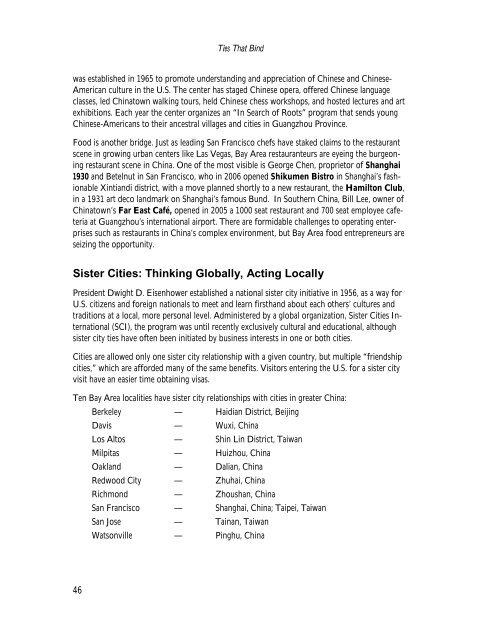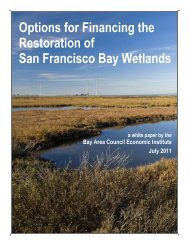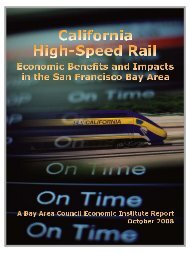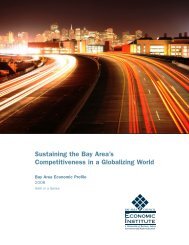Ties That Bind - Bay Area Council Economic Institute
Ties That Bind - Bay Area Council Economic Institute
Ties That Bind - Bay Area Council Economic Institute
You also want an ePaper? Increase the reach of your titles
YUMPU automatically turns print PDFs into web optimized ePapers that Google loves.
46<br />
<strong>Ties</strong> <strong>That</strong> <strong>Bind</strong><br />
was established in 1965 to promote understanding and appreciation of Chinese and Chinese-<br />
American culture in the U.S. The center has staged Chinese opera, offered Chinese language<br />
classes, led Chinatown walking tours, held Chinese chess workshops, and hosted lectures and art<br />
exhibitions. Each year the center organizes an “In Search of Roots” program that sends young<br />
Chinese-Americans to their ancestral villages and cities in Guangzhou Province.<br />
Food is another bridge. Just as leading San Francisco chefs have staked claims to the restaurant<br />
scene in growing urban centers like Las Vegas, <strong>Bay</strong> <strong>Area</strong> restauranteurs are eyeing the burgeoning<br />
restaurant scene in China. One of the most visible is George Chen, proprietor of Shanghai<br />
1930 and Betelnut in San Francisco, who in 2006 opened Shikumen Bistro in Shanghai’s fashionable<br />
Xintiandi district, with a move planned shortly to a new restaurant, the Hamilton Club,<br />
in a 1931 art deco landmark on Shanghai’s famous Bund. In Southern China, Bill Lee, owner of<br />
Chinatown’s Far East Café, opened in 2005 a 1000 seat restaurant and 700 seat employee cafeteria<br />
at Guangzhou’s international airport. There are formidable challenges to operating enterprises<br />
such as restaurants in China’s complex environment, but <strong>Bay</strong> <strong>Area</strong> food entrepreneurs are<br />
seizing the opportunity.<br />
Sister Cities: Thinking Globally, Acting Locally<br />
President Dwight D. Eisenhower established a national sister city initiative in 1956, as a way for<br />
U.S. citizens and foreign nationals to meet and learn firsthand about each others’ cultures and<br />
traditions at a local, more personal level. Administered by a global organization, Sister Cities International<br />
(SCI), the program was until recently exclusively cultural and educational, although<br />
sister city ties have often been initiated by business interests in one or both cities.<br />
Cities are allowed only one sister city relationship with a given country, but multiple “friendship<br />
cities,” which are afforded many of the same benefits. Visitors entering the U.S. for a sister city<br />
visit have an easier time obtaining visas.<br />
Ten <strong>Bay</strong> <strong>Area</strong> localities have sister city relationships with cities in greater China:<br />
Berkeley — Haidian District, Beijing<br />
Davis — Wuxi, China<br />
Los Altos — Shin Lin District, Taiwan<br />
Milpitas — Huizhou, China<br />
Oakland — Dalian, China<br />
Redwood City — Zhuhai, China<br />
Richmond — Zhoushan, China<br />
San Francisco — Shanghai, China; Taipei, Taiwan<br />
San Jose — Tainan, Taiwan<br />
Watsonville — Pinghu, China








